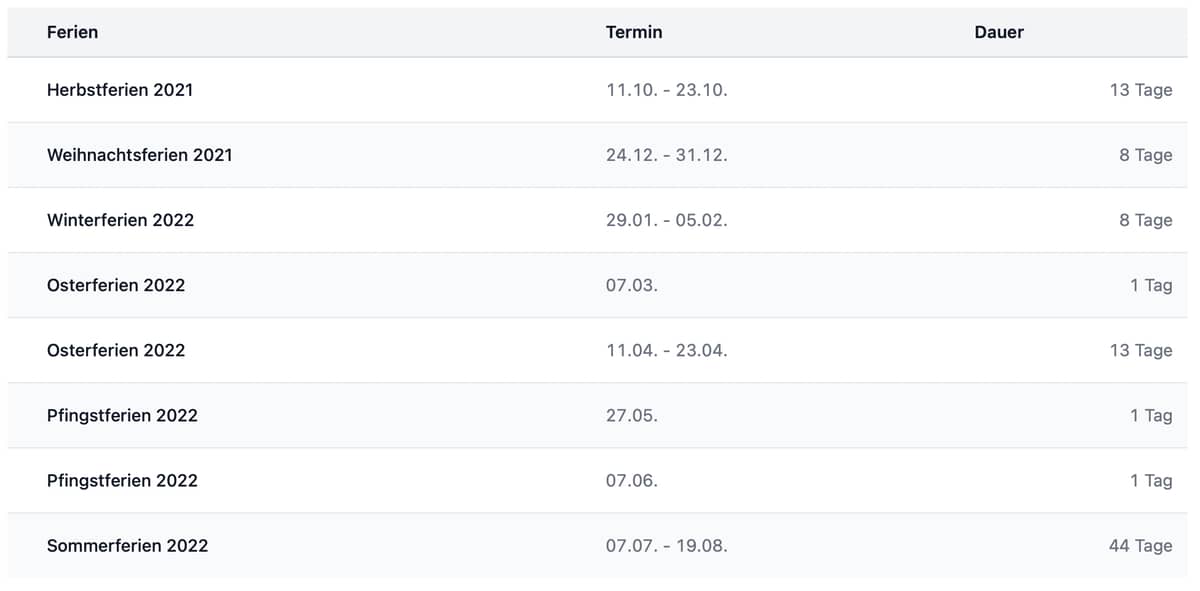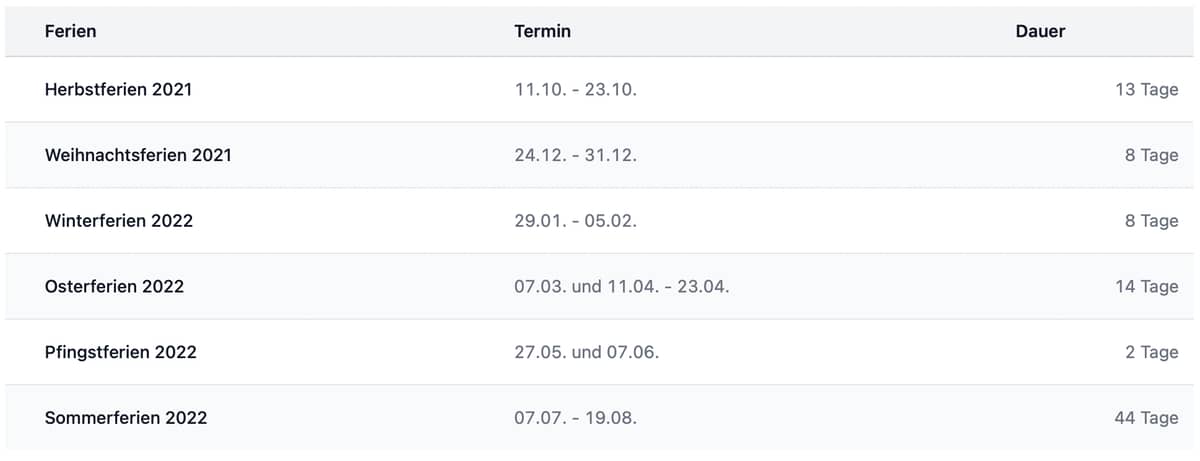It’s me again. I am still struggling with the group_by problem from Group within a list I am sorry to bother you with this. I am stuck to find a good solution for this trivial problem.
Here’s the current table:
And here is the table I want to render. Without the duplicate entries for “Osterferien 2022” and “Pfingstferien 2022” but with the new calculated days:
The template code:
<tbody class="bg-white divide-y divide-gray-200 dark:bg-gray-900 dark:divide-gray-600">
<%= for {period, index} <- Enum.with_index(@school_vacation_periods) do %>
<tr class={if rem(index, 2) == 0 do "bg-white dark:bg-black" else "bg-gray-50 dark:bg-black" end}>
<td class="py-4 pl-4 pr-3 text-sm font-medium text-gray-900 sm:pl-6 lg:pl-8 dark:text-gray-100"><%= period.colloquial %> <%= period.starts_on.year %></td>
<td class="px-3 py-4 text-sm text-gray-500 whitespace-nowrap dark:text-gray-300 tabular-nums">
<%= Calendar.strftime(period.starts_on, "%d.%m.") %><%= if period.starts_on != period.ends_on do %> - <%= Calendar.strftime(period.ends_on, "%d.%m.") %><% end %>
</td>
<td class="px-3 py-4 text-sm text-right text-gray-500 whitespace-nowrap dark:text-gray-300 tabular-nums"><%= period.days %> Tag<%= unless period.days == 1 do %>e<% end %></td>
</tr>
<% end %>
</tbody>
The data:
@school_vacation_periods = [
%{
colloquial: "Herbstferien",
days: 13,
ends_on: ~D[2021-10-23],
holiday_or_vacation_type_slug: "herbst",
starts_on: ~D[2021-10-11]
},
%{
colloquial: "Weihnachtsferien",
days: 8,
ends_on: ~D[2021-12-31],
holiday_or_vacation_type_slug: "weihnachten",
starts_on: ~D[2021-12-24]
},
%{
colloquial: "Winterferien",
days: 8,
ends_on: ~D[2022-02-05],
holiday_or_vacation_type_slug: "winter",
starts_on: ~D[2022-01-29]
},
%{
colloquial: "Osterferien",
days: 1,
ends_on: ~D[2022-03-07],
holiday_or_vacation_type_slug: "ostern-fruehjahr",
starts_on: ~D[2022-03-07]
},
%{
colloquial: "Osterferien",
days: 13,
ends_on: ~D[2022-04-23],
holiday_or_vacation_type_slug: "ostern-fruehjahr",
starts_on: ~D[2022-04-11]
},
%{
colloquial: "Pfingstferien",
days: 1,
ends_on: ~D[2022-05-27],
holiday_or_vacation_type_slug: "himmelfahrt-pfingsten",
starts_on: ~D[2022-05-27]
},
%{
colloquial: "Pfingstferien",
days: 1,
ends_on: ~D[2022-06-07],
holiday_or_vacation_type_slug: "himmelfahrt-pfingsten",
starts_on: ~D[2022-06-07]
},
%{
colloquial: "Sommerferien",
days: 44,
ends_on: ~D[2022-08-19],
holiday_or_vacation_type_slug: "sommer",
starts_on: ~D[2022-07-07]
}
]
I initially thought that it would be best to solve the problem in the controller (the reason for my initial question). But now I think the problem needs to be handled in the template because I actually need the data for an additional ical export in an other template.
I am stuck. The best solution I come up is something like this:
<%= if index + 1 != Enum.count(@school_vacation_periods) do %>
<%= if Enum.at(@school_vacation_periods, index + 1).colloquial == period.colloquial do %>
Whatever
<% end %>
<% end %>
But that is not clean.
What is the best way to tackle this?

























